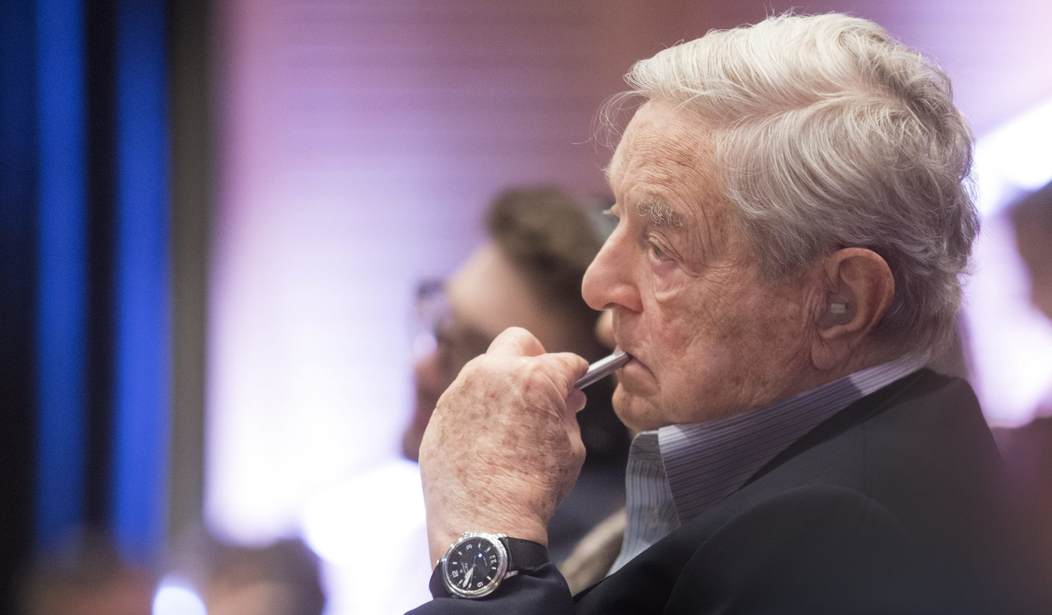The Internet is crawling with loonie stories alleging that liberal funder George Soros is a frontman for the Rothschild banking family, in the service of a conspiracy for world government. In the 19th century, to be sure, the Rothschild bank exercised enormous power at the peak of British and French financial influence. Today the Rothschild bank in London is a boutique with annual profits of about $70 million, a rounding error in the accounts of a J.P. Morgan, Morgan Stanley or Goldman Sachs. Never you mind, respond the paranoids: the Rothschilds are a hidden octopus, and the fact that we don’t see their money proves that it’s all a conspiracy. You can’t talk sense to tin hats.
There is one part of this story that I can clarify, however: I am the Jewish banker responsible for a large part of Soros’ fortune. It wasn’t intentional, and I’m sorry about it, but there was no conspiracy involved, let alone a Jewish one. Soros already was rich when our paths crossed; he had made several billion dollars for his investors speculating against the British pound in 1992. His next great trade was a short against the Thai baht during the great Asian financial crisis of 1997, and that’s where I came in.
During 1995 and 1996, Thailand took in vast amounts of foreign money. This fed a bubble in real estate prices that was at the point of popping. At the end of December 1996, I traveled to Bangkok with a plan to reorganize Thai banks’ real-estate debts on the model of America’s successful resolution of the savings and loan crash of the late 1980s. Asia Times then was a print newspaper and its publisher had good contacts with the government. I cooled my heels and waited.
On New Year’s Eve 1996, a Saturday night, I went out with friends from Asia Times. We started drinking over dinner at a Chinese restaurant on the Bangkok River and finished at around 6:00 a.m. Thailand grows the world’s sweetest oranges, and they make a delicious Screwdriver. I lost count of how many I had before I poured myself into a taxi and made it back to my hotel on my own power.
The phone rang at 9:00 a.m. It was Asia Times’ publisher. “Your meeting at the prime minister’s office came through,” he said. “Be there in an hour.” With the worst hangover of my life, I stumbled into the shower and into a suit, and took a hotel car to the prime minister’s office. There I presented my plan to a dozen staffers. They listened politely. The chief of staff said, “The financial situation is even worse than you think. The problem is that your plan would wipe out some of the existing shareholders, and every Bangkok bank has several members of parliament in its pocket. Our hands our tied. Have a nice day.”
I don’t think I’ve been in a worse mood, ever. I took a taxi to Asia Times’ offices and dashed out an indignant, unsigned editorial saying that the fecklessness and incompetence of the Thai banks and government would lead to a currency crash some time in 1997. Asia Times printed it. I went back to New York.
A few weeks later, Arminio Fraga, then a portfolio manager at Soros’ Quantum fund and later the chief of Brazil’s central bank, turned up unannounced at Asia Times’ Bangkok headquarters. He would very much like to see the author of the editorial, he said. He was received by editor Uwe Parpart, who let him cool his heels for a couple of hours while he put the issue to bed. Then he bought Fraga a beer and they talked about the vulnerability of the Thai baht. Fraga persuaded Soros to take a massive position against the Thai baht, and the rest is history.
Those are the facts, and I have witnesses to confirm every detail of my claim. Sadly, I made no money on the trade; I was managing a mortgage fund in the U.S. at the time, and had no mandate to speculate in currencies.
That’s how things actually happen in the real world of finance. I had an insider’s view of what was happening in the Thai government, to be sure, but no real insider information: anyone looking at the data carefully could have come to the same conclusion. The Rothschilds were nowhere in evidence; it was Goldman (David Goldman, not Goldman Sachs) who put Soros onto his best trade of the 1990s, a cornerstone of his now $25 billion fortune.
Soros is a terrible fellow, to be sure, with an open checkbook for political causes I abhor. But he is hardly a puppet of a global banking conspiracy, Jewish or otherwise. There is a lunatic fringe, though, that believes in such a conspiracy. I emphasize both lunatic and fringe: the number of tin-hat conspiracy theorists out there is far smaller than the paranoid left would have us believe. The only recent article on Breitbart.com to mention the Rothschild banking family reports on Jewish protests at the publication in Germany of a book about…the Rothschild banking family. It is a progressive canard that American populism is infested with anti-Semites, just as it is a lunatic hallucination on the fringe of the right that certain Jews run a global financial conspiracy.
As an afterthought: The remarkable success of the Jewish people, though, does bear comment. A fifth of all Nobel prize-winners since 1901 were Jewish, and I have not yet heard it alleged that the Rothschilds bribed the Swedish Academy to award their coreligionists. Jews are less than 0.2% of the world’s population, so their proportion of Nobel prizes is a hundred times their percentage of population. Jews have won more than a quarter of all Fields Medals, the most prestigious award in mathematics. There are no similar gauges in music, although it is clear that Jews have made a disproportionate contribution to Western classical music. There’s no money in mathematics or classical music, yet they are disproportionately Jewish vocations.
None of this, I believe, has anything to do with supposed genetic advantages in intelligence. Israeli Arabs, once they are integrated into the educational mainstream, do quite as well as their Jewish counterparts. This year Arabs comprised 38% of the medical students at Israel’s most prestigious technology school, the Haifa Technion. A fifth of all Israeli medical students are Arabs, equal to their proportion of the population. By other measures, to be sure, Arabs lag Jews in Israel, but parity in medical studies suggests that there is no important difference in inborn intelligence.
Jewish accomplishment, I believe, is rooted in a unique characteristic of the religion itself. Barely a generation passed after the emancipation of European Jews from the ghetto before Jewish names appeared in the top tier of European science and art–Carl Gustav Jacobi in mathematical physics, Heinrich Heine in literature, Felix Mendelssohn in music.
Jewish accomplishment in secular fields is rooted in the distinctive practice of Jewish religion. For Jews, critical study of sacred sources is the single most important religious obligation. Even Jews who have fallen away from our core practices retain this sensibility. The Hebrew Bible and the body of rabbinic commentary that interpreted it for more than two millennia are a guide to human action in an imperfect world. The Jewish sages of antiquity maintained that God deliberately left creation incomplete so that humanity could become God’s partner in finishing the work of creation. That is a central theme in the teaching of the preeminent rabbinic thinker of the 20th century, Rabbi Joseph Dov Soloveitchik. Improving nature to enhance the dignity of man, for example by curing disease or defending against natural disaster, is a sacred obligation. Quietly but profoundly this idea has exercised enormous influence on Western science, as I reported in a 2016 article in the Jewish quarterly Hakirah. The atheist Voltaire cited the great Lisbon earthquake of 1755 to challenge the idea of a beneficent God. The Jewish response is not, “How could God let this happen?,” but rather, “What must we do to protect ourselves against earthquakes?”
Torah study is an encounter with the infinite mind of God, as Rabbi Meir Y. Soloveichik explained in a 2010 essay in First Things, in which the most desired outcome is to discover something new and heretofore unknown–a “hiddush,” or innovation. Traditionally, Jewish children began learning the Hebrew letters at age 3 and began formal schooling at age 5. But this bears no resemblance to the rote memorization of the Koran in Muslim madrassahs. Rabbinic studies (Talmud) consist of the reports of debates among the sages of antiquities as well as medieval and early modern commentators, for Judaism preserves minority as well as majority opinions. Students do not immerse themselves in doctrine, but rather learn the fine points of disagreement among the great authorities of the past. “This as well as that,” states a famous dictum about a disagreement between two great rabbis of antiquity, “are words of the living God,” although we follow the ruling of one rather than the other.
I grew up in a secular family for whom religious tradition was a nostalgic memory rather than a living practice, and my experience of the transcendental was limited to classical music–a very inadequate ersatz, to be sure. Still, there was something distinctively Jewish in my approach to music. My adviser in a music doctoral program was a scholar who claimed descent from a long line of Hungarian rabbis, men who knew the Talmud so well that if they stuck a pin through a page, they would know the word it pierced on the versa.
If you really want to know what made the Rothschilds so successful, I refer you to my 2015 essay, “Why Jews are Good at Money.“










Join the conversation as a VIP Member